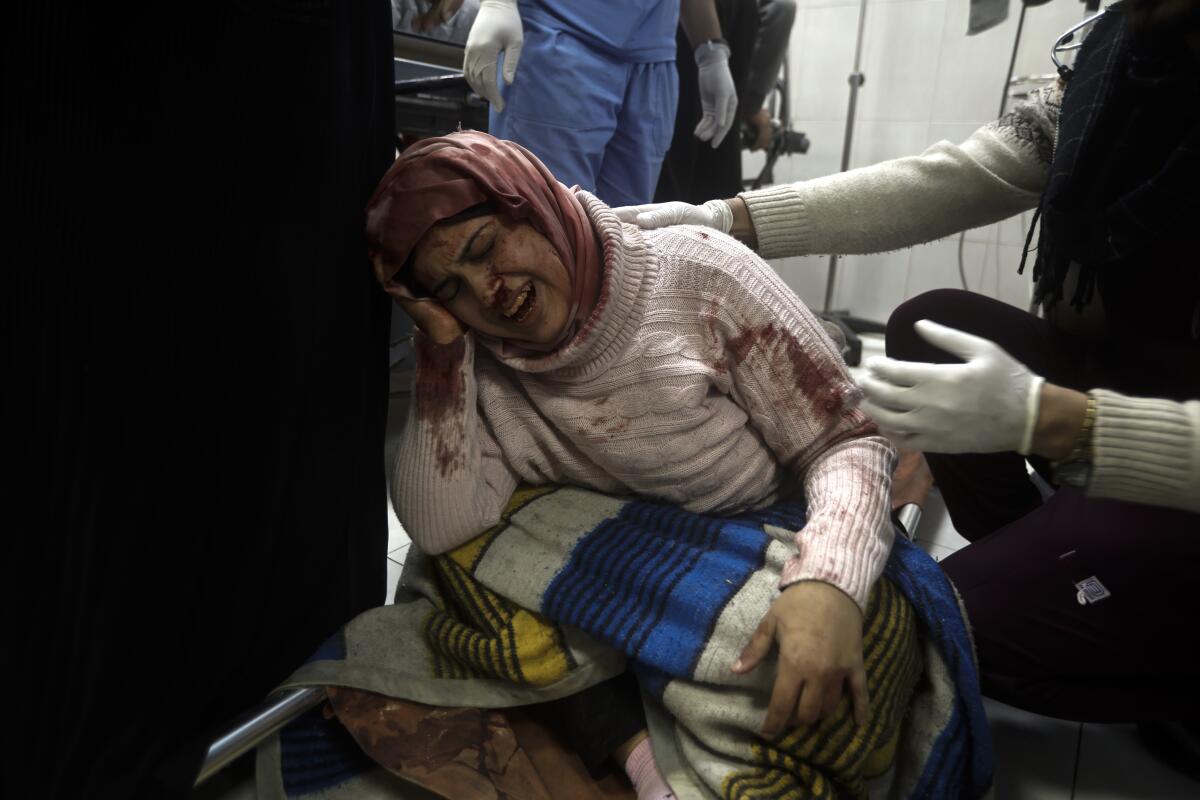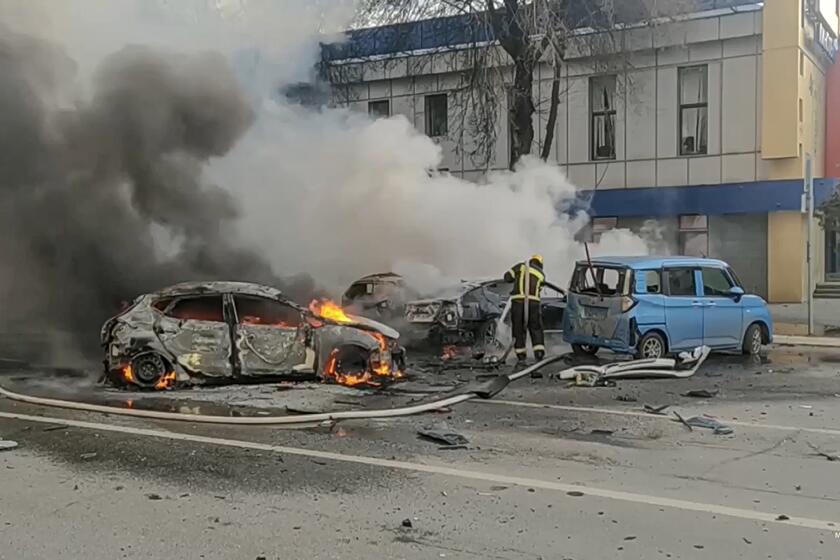Netanyahu says Gaza war on Hamas will go on for ‘many more months,’ thanks U.S. for new weapons sales

- Share via
DEIR AL BALAH, Gaza Strip — Prime Minister Benjamin Netanyahu said Saturday that Israel’s war on Hamas in Gaza will continue for “many more months,” pushing back against persistent international cease-fire calls after mounting civilian deaths, hunger and mass displacement in the besieged seaside enclave.
Netanyahu thanked the Biden administration for its continued backing, including approval for a new emergency weapons sale, the second this month, and prevention of a U.N. Security Council resolution seeking an immediate cease-fire. Israel argues that ending the war now would mean victory for Hamas, a stance shared by the Biden administration, which at the same time urged Israel to do more to avoid harm to Palestinian civilians.
The Health Ministry in Gaza said Saturday that more than 21,600 Palestinians have been killed and 56,000 wounded in Israel’s unprecedented air and ground offensive since the deadly Oct. 7 Hamas attack on southern Israel in which the militants killed at least 1,200 people, mostly civilians, and kidnapped more than 240 others.
The Hamas-run ministry, which does not distinguish between the deaths of civilians and combatants, said 165 Palestinians had been killed over the previous 24 hours. It has said about 70% of those killed have been women and children.
In new fighting, Israeli warplanes struck the urban refugee camps of Nuseirat and Bureij in the center of the territory Saturday as ground forces pushed deeper into the southern city of Khan Yunis.
Even a brief halt in fighting seems extremely unlikely.
Egypt, one of the mediators between Israel and Hamas, has proposed a multistage plan that would kick off with a swap of hostages for prisoners, accompanied by a temporary cease-fire — along the lines of an exchange during a weeklong truce in November.
Hamas insists the war must end before it will discuss hostage releases. Osama Hamdan, a senior Hamas official in Beirut, reiterated that position Saturday, but also told the Associated Press that “we have not given any final answer so far” to the Egyptian proposal.
Asked about reports of possible progress toward a deal, Netanyahu said Saturday that “we see a possibility, maybe, for movement” but that he did not want to raise “exaggerated expectations.”
Israel has said it will pursue its unprecedented air and ground offensive until it has dismantled Hamas, a goal viewed by some as unattainable because of the militant group’s deep roots in Palestinian society. The United States has shielded Israel diplomatically and has continued to supply weapons.
Authorities say shelling in the center of the Russian border city of Belgorod has killed 21 people, including three children, and injured 110 others.
The war has displaced some 85% of the Gaza Strip’s 2.3 million residents, with many following Israeli directives to seek shelter in designated safe areas. But some of these areas have nevertheless been bombed, leaving Palestinians with a sense that nowhere is safe in the tiny enclave.
With Israeli forces expanding their ground offensive, tens of thousands more Palestinians streamed into the already crowded city of Rafah at the southernmost end of Gaza.
Thousands of tents and makeshift shacks have sprung up on Rafah’s outskirts next to U.N. warehouses. Displaced people arrived in Rafah on foot or on trucks and carts piled high with mattresses. Those who did not find space in overwhelmed shelters pitched tents on roadsides.
“We don’t have water. We don’t have enough food,” Nour Daher, a displaced woman, said Saturday from the sprawling tent camp. “The kids wake up in the morning wanting to eat, wanting to drink. It took us one hour to find water for them. We couldn’t bring them flour. Even when we wanted to take them to toilets, it took us one hour to walk.”
Nuseirat resident Mustafa Abu Wawee said a strike hit the home of one of his relatives, killing two people.
The Israelis are “doing everything to force people to leave,” he said over the phone while searching along with others for four people missing under the rubble. “They want to break our spirit and will but they will fail. We are here to stay.”
A second strike late Friday in Nuseirat targeted the home of a journalist for Al Quds TV, a channel linked to the group Islamic Jihad whose militants also participated in the Oct. 7 attack. The channel said the journalist, Jaber Abu Hadros, and six members of his family were killed.
Bureij resident Rami Abu Mosab said sounds of gunfire echoed across the camp overnight, followed by heavy airstrikes Saturday.
The State Department said Friday that Secretary of State Antony J. Blinken told Congress he approved a $147.5-million sale for equipment, including fuses, charges and primers, that is needed for 155 mm shells Israel bought previously.
It marked the second time this month that the Biden administration was bypassing Congress to approve an emergency weapons sale to Israel. The department cited the “urgency of Israel’s defensive needs” as a reason for the approval.
Blinken made a similar decision on Dec. 9 to approve the sale to Israel of nearly 14,000 rounds of tank ammunition worth more than $106 million.
Both moves have come as President Biden’s request for a nearly $106-billion aid package for Ukraine, Israel and other national security needs remains stalled in Congress, caught up in a debate over U.S. immigration policy and border security. Some Democratic lawmakers have spoken of making the proposed $14.3 billion in American assistance to its Mideast ally contingent on concrete steps by Netanyahu’s government to reduce civilian casualties in Gaza during the war with Hamas.
Blinken, who has repeatedly traveled to the Middle East during the war, was expected back in Israel and other countries in the region in January. U.S. officials have urged Israel to start shifting from high intensity combat to more targeted operations, but said they were not imposing a deadline.
With more than 120 hostages remaining in Gaza, Netanyahu said Israel needs more time.
“As the chief of staff said this week, the war will continue many more months,” he told a televised news conference Saturday. “My policy is clear. We will continue to fight until we have achieved all the objectives of the war, first and foremost the annihilation of Hamas and the release of all the hostages.”
Netanyahu is also at odds with the Biden administration over who should run Gaza after the war. He has rejected the U.S.-backed idea that a unified Palestinian government should run both Gaza and parts of the Israeli-occupied West Bank as a precursor to eventual statehood. Instead, he has insisted on open-ended Israeli security control in Gaza, without saying what would come next.
More than a week after a U.N. Security Council resolution called for the unhindered delivery of aid at scale across besieged Gaza, conditions have only worsened, U.N. agencies said.
Aid officials said the aid entering Gaza remains woefully inadequate. Distributing goods is hampered by long delays at two border crossings, ongoing fighting, Israeli airstrikes, repeated cuts in internet and phone services and a breakdown of law and order that makes it difficult to secure aid convoys, they said.
Nearly the entire population is fully dependent on outside humanitarian aid, said Philippe Lazzarini, head of UNRWA, the U.N. agency for Palestinian refugees. A quarter of the population is starving because too few trucks enter with food, medicine, fuel and other supplies — sometimes fewer than 100 trucks a day, according to U.N. daily reports.
U.N. monitors said operations at the Israeli-run Kerem Shalom crossing halted for four days this week because of security incidents, such as a drone strike and the seizing of aid by desperate Gaza residents.
They said the crossing reopened Friday, and that a total of 81 aid trucks entered Gaza through Kerem Shalom and the Rafah crossing on the Egyptian border — compared with the typical prewar volume of 500 trucks a day.
The Israeli military says 168 of its soldiers have been killed since the ground offensive began.
Mediator Egypt’s proposed plan for a hostage-prisoner swap and temporary cease-fire would be followed by talks on forming a transitional Palestinian government of experts who would run both Gaza and the Israeli-occupied West Bank.
Israel and Hamas remain far apart on the terms of a cease-fire and future swaps.
“We have been clear that a complete cease-fire is the first step,” Hamdan said Saturday. It’s a position that seemingly derails the Egyptian plan, though Hamdan also said conversations are continuing.
“There are also ideas we have received through our brothers in Qatar, and we have not given any final answer so far,” he said. “This may take some time. We are keen to talk about the details, because the idea put forward today may develop in different ways and may no longer be raised at all.”
Magdy reported from Cairo. Associated Press writer Jack Jeffery in London contributed to this report.
More to Read
Sign up for Essential California
The most important California stories and recommendations in your inbox every morning.
You may occasionally receive promotional content from the Los Angeles Times.














